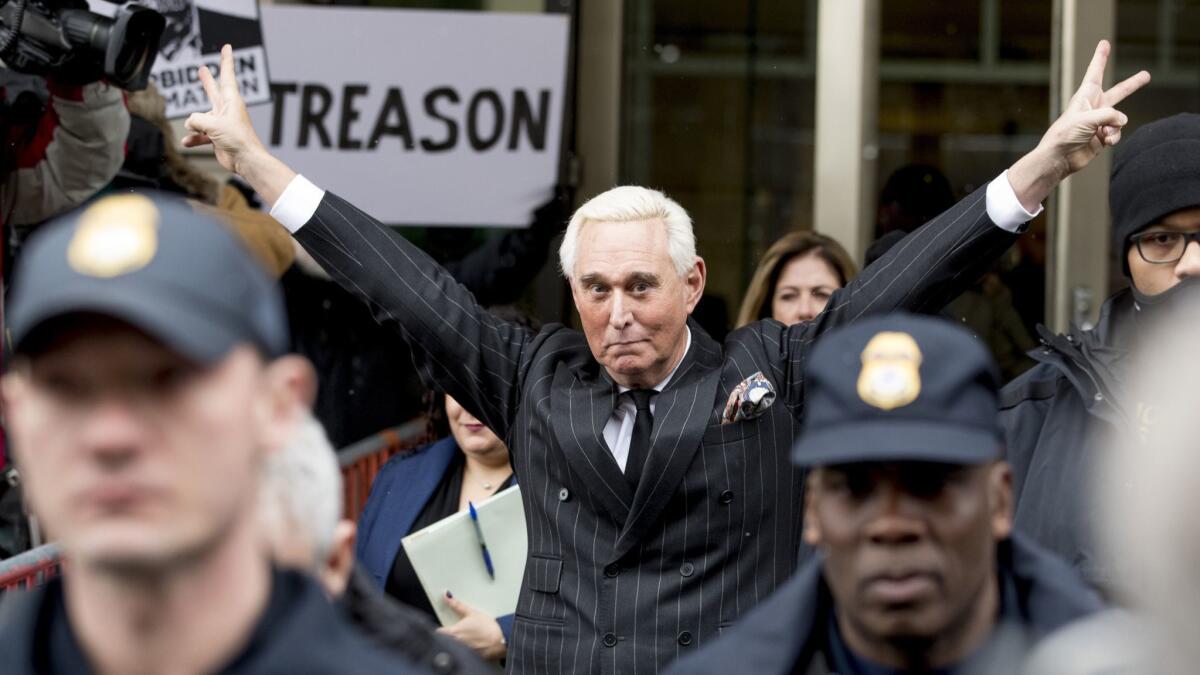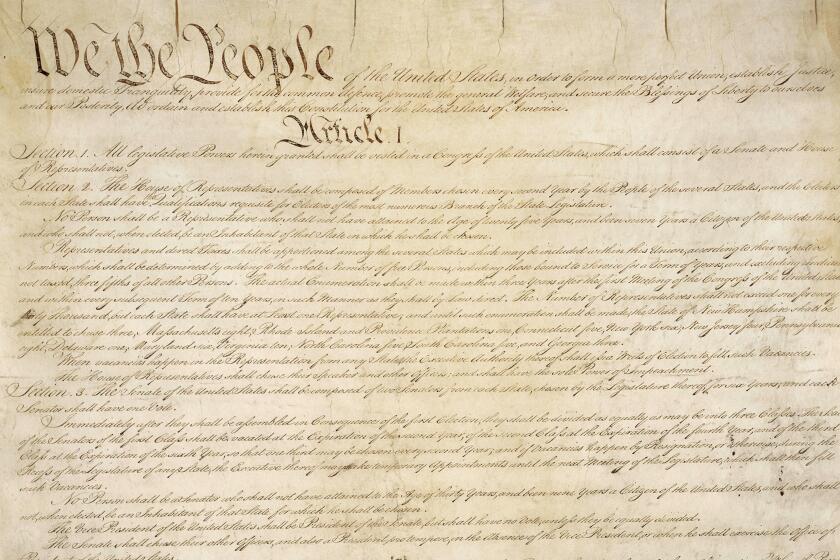Column: It’s Roger Stone’s Republican Party now

Roger Stone is an infamously execrable force in American politics. Perhaps his only saving grace is he’s not a hypocrite about it.
Stone is a proud dirty trickster. The GOP kept him on a long leash lest his amorality be too closely associated with the Republican brand. Part of his code is that the best defense against legitimate criticism is to shoot the messenger: “Admit nothing, deny everything, launch counterattack.”
As a cynic, if not an outright sybaritic nihilist, Stone would find the very notion of legitimate criticism foolish. “Nothing is on the level,” he says. What’s right is whatever you can get away with. “It’s better to be infamous than never famous at all.” (These bits of wisdom are laid out in “Stones Rules,” which reads like Mao’s Little Red Book of Trumpism.)
I suspect that one reason Stone has a cult following on the right and among many in the media — a fan base that long predates his status as a Trump loyalist — is his willingness to own his political amorality in unapologetic sound bite form, thus immunizing himself from conventional charges of hypocrisy. When you turn deceit and dishonor into guiding principles, the only way you can be a hypocrite is if you fail to go low enough.
But Stone’s hypocrisy exemption isn’t transferable. His defenders, and defenders of President Trump’s Friday night commutation of Stone’s prison sentence for seven felony counts of perjury, obstruction of Congress and witness tampering, won’t escape judgment for their two-faced behavior.
A day after President Trump commuted the prison sentence of his longtime confidante Roger Stone, former special counsel Robert Mueller III broke his silence to sharply defend the prosecution and his investigation into ties between Russia and Trump’s 2016 presidential campaign.
The three main commutation defenses, all offered with Stonian shamelessness are 1) the president has the power to do it; 2) it was warranted because Stone’s conviction was part of the “Russia hoax”; and 3) other presidents used their pardon and commutation power corruptly too.
The first defense is true as far as it goes, though it’s a straw man given that few dispute it. It also leaves out James Madison’s famous example of a non-criminal but impeachable presidential act: If “the President be connected, in any suspicious manner, with any person” he shelters from justice, Congress would be within its rights to impeach him for it.
Second, whatever you think of the Russia investigation, Stone is guilty of the crimes he was tried for. Indeed, those crimes should enrage those who tout the president’s “total exoneration.” If Stone believed Trump to be wholly innocent and that the Russia collusion claim was a hoax, why not fully cooperate with investigators to clear the air? Moreover, why would Atty. Gen. William Barr — vilified on the left and lionized on the right for being a Trump loyalist — oppose Stone’s commutation and defend his prosecution as “righteous”?
The third, and most popular, defense is the one that reeks of hypocrisy.
A particularly common talking point is that Bill Clinton abused his pardon power too (Of course, Trump’s defenders don’t say “too” because that would concede that Trump is abusing his power). Clinton pardoned his own brother! He pardoned billionaire fugitive and Clinton fundraiser Marc Rich!
Roger Clinton’s pardon was indeed unseemly. But unlike Stone, he had already served his full sentence. The Rich pardon was worse, but unlike Stone, Rich was not being rewarded for his silence in an investigation of the president.
And here’s the hypocrisy. The right was furious about these pardons. The GOP-controlled Senate held angry hearings on the Rich pardon. Newt Gingrich called it “a very profound attack on our criminal justice system.” Then-Sen. Arlen Specter (R-Penn.) suggested it was impeachable, even though Clinton’s presidency was all but over. Fox’s Tucker Carlson, then of CNN, correctly called it “indefensible.”
And liberals denounced it too. Jimmy Carter was outraged by the Rich pardon. New York Sen. Chuck Schumer couldn’t “think of a single justification for [it].” “It was inexcusable. It was outrageous,” said Vermont’s Sen. Pat Leahy. Massachusetts Rep. Barney Frank called it a “real betrayal” of Clinton’s supporters. “It was contemptuous.”
You can argue, as many of us did at the time, that liberal outrage over Clinton’s pardon of Rich was a convenient way to criticize the president when the criticism didn’t matter anymore. But at least they called the inexcusable inexcusable.
A few on the right — including two senators, Mitt Romney and Pat Toomey — have stepped up. But the majority seem not just willing but thrilled to excuse the inexcusable — admitting nothing, denying everything and launching counterattacks. Indeed, Senate Judiciary Chairman Lindsey Graham said Sunday he wants to grill special counsel Robert S. Mueller III because Mueller penned an op-ed defending the Stone prosecution.
Congratulations, Roger Stone. It’s your party now.
More to Read
A cure for the common opinion
Get thought-provoking perspectives with our weekly newsletter.
You may occasionally receive promotional content from the Los Angeles Times.








